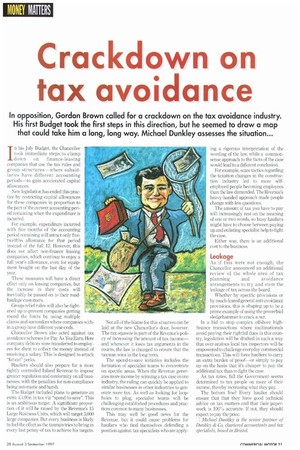Crackdown on tax avoidance
Page 23

If you've noticed an error in this article please click here to report it so we can fix it.
In opposition, Gordon Brown called for a crackdown on the tax avoidance industry. His first Budget took the first steps in this direction, but he seemed to draw a map that could take him a long, long way. Michael Dunkley assesses the situation...
In his July Budget, the Chancellor took immediate steps to clamp down on finance-leasing companies that use the tax rules and group structures—where subsidiaries have different accounting periods—to gain accelerated capital allowances.
New legislation has ended this practice by restricting capital allowances for these companies in proportion to the part of the current accounting period remaining when the expenditure is incurred.
For example, expenditure incurred with five months of the accounting period remaining will attract only fivetwelfths allowance for that period instead of the full 12. However, this does not affect non.finance leasing companies, which continue to enjoy a full year's allowance, even for equipment bought on the last day of the year.
These measures will have a direct effect only on leasing companies, but the increase in their costs will inevitably he passed on to their roadhaulage customers.
Group-relief rules will also be tightened up to prevent companies getting round the limits by using multiple claims and surrenders where companies within a group have different year-ends Chancellor Brown also acted against tax avoidance schemes for Pay As You Earn. Here company debtors were transferred to employees for them to collect the money instead of receiving a salary. This is designed to attack "fat-cat" perks.
Hauliers should also prepare for a more tightly controlled Inland Revenue to impose greater regulation and conformity on all businesses, with the penalties for non-compliance being automatic and harsh.
The Budget included plans to generate an extra .124.9bn in tax via "spend-to-save". This is an ambitious target. A significant proporfion of it will he raised by the Revenue's 15 Large Business Units, which will target 3,000 large companies. But every business is likely to feel the effect as the taxman tries to bring in every last penny of tax to achieve his targets. Not all of the blame for this situation can be laid at the new Chancellor's door, however. The tax squeeze is part of the Revenue's policy of increasing the amount of tax income— and whenever it loses tax arguments in the courts, the law is changed to ensure that the taxman wins in the long term.
The spend-to-save initiative includes the formation of specialist teams to concentrate on specific areas. When the Revenue generates more income by winning a tax case in one industry, the ruling can quickly be applied to similar businesses in other industries to generate more tax. As well as looking for loopholes to plug, specialist teams will be challenging established procedures and practices common to many businesses.
This may well he good news for the Revenue, but it could cause problems for hauliers who find themselves defending a position against tax specialists who are apply
ing a rigorous interpretation of the wording of the law, while a commonsense approach to the facts of the case would lead to a different conclusion.
For example, scare tactics regarding the taxation changes in the construction industry led to more selfemployed people becoming employees than the law demanded. The Revenue's heavy-handed approach made people change with few questions.
The amount of tax you have to pay will increasingly rest on the meaning of one or two words, so busy hauliers might have to choose between paying up and enlisting specialist help to fight the case.
Either way, there is an additional cost to the business.
Leakage
As if this were not enough, the Chancellor announced an additional review of the whole area of tax planning and avoidance arrangements to try and stem the leakage of tax across the board.
Whether by specific provisions or by much-feared general anti-avoidance provisions, this is shaping up to be a prime example of using the proverbial sledgehammer to crack a nut.
In a bid to stop complex offshore highfinance transactions where multinationals avoid paying their rightful dues in this country, legislation will be drafted in such a way that over-zealous local tax inspectors will be empowered to challenge everyday commercial transactions. This will force hauliers to carry an extra burden of proof—or simply to pay up on the basis that it's cheaper to pay the additional tax than to fight the case.
As tax rates, fall the Government seems determined to tax people on more of their income, thereby increasing what they pay.
The bottom line? Every haulier should ensure that that they have good technical advice on tax matters and that their paperwork is 100% accurate. If not, they should expect to pay the price.
-1 Michael Mulkey is the senior partner of Dunkley & Co, chartered accountants and tax specialists, based in Bristol
































































































